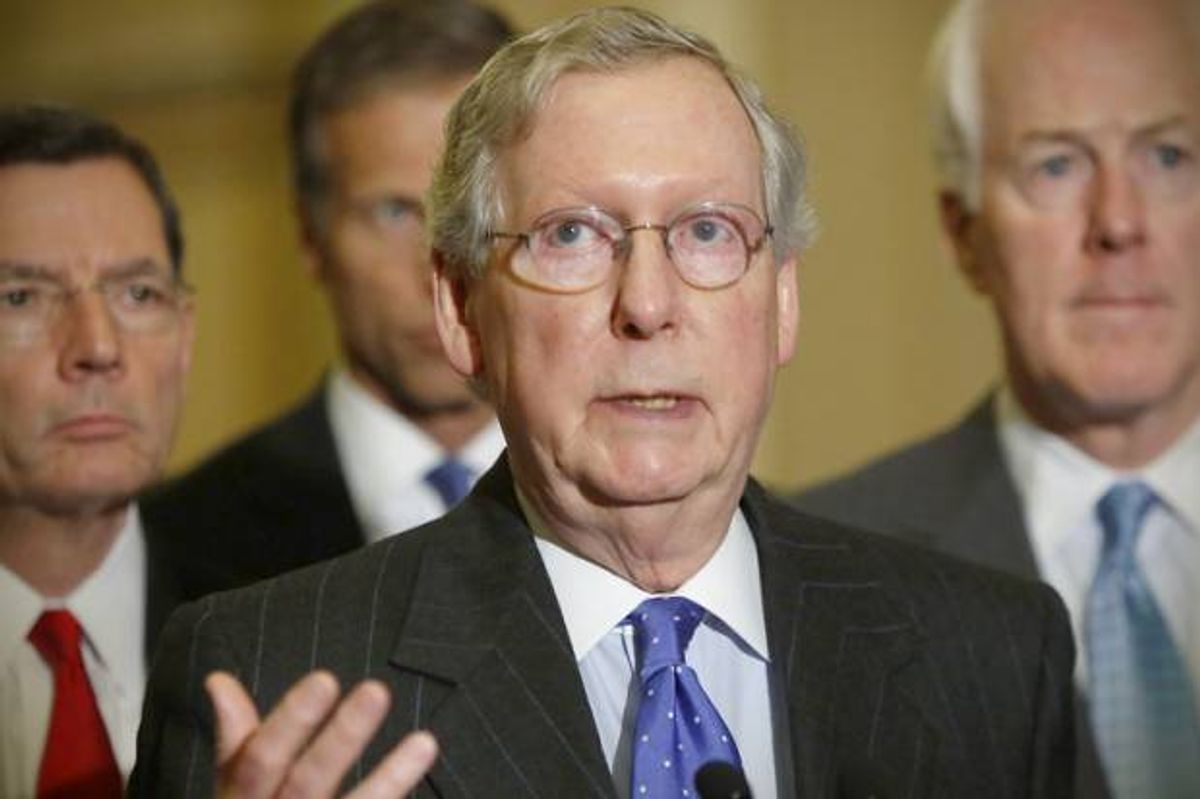Last week, as Mitch McConnell and Alison Lundergan Grimes were squaring off in their only debate of the election season, McConnell made the case that he not the single-minded obstructionist that Democrats and his own record make him out to be. Rather, the Senate minority leader argued, he’s an enthusiastic proponent of bipartisan compromise and will pursue this passion for consensus bridge building as the Senate majority leader, should he ascend to the post.
As I pointed out at the time, the evidence McConnell cited to make his case was extraordinarily weak: a smattering of bipartisan agreements that Republicans reluctantly agreed to because the alternative was literal economic catastrophe. By his own accounting, McConnell’s passion for consensus emerges only when the country has a gun to its head.
Things have only gotten weirder since then. According to Kentucky political reporter Joe Sonka, McConnell is back to promoting himself as a bipartisan consensus builder, and citing his involvement in George W. Bush’s disastrous 2005 attempt to privatize Social Security:
Though he hasn’t mentioned it much on the campaign trail over the past year, McConnell specifically touted his effort to push President George W. Bush’s plans to reform Social Security in 2005, which would have set up private accounts for retirees.
“After Bush was re-elected in 2004 he wanted us to try to fix Social Security,” said McConnell. “I spent a year trying to get any Democrat in the Senate — even those most reasonable Democrat of all, Joe Lieberman – to help us.”
I have absolutely no idea what McConnell intends to accomplish here. For someone trying to convince others of his ability to forge cross-party agreements, this is an almost unbelievably terrible argument.
For those who might be a bit rusty on the history, the very first thing George Bush spent his post-reelection “political capital” on was a push to drastically alter the Social Security program and allow workers to divert a portion of their payroll taxes into private investment accounts. It was a disaster. The more Bush tried to pitch Americans on the plan, the more they hated it. Souring public opinion emboldened Democrats in Congress to put up a united front against the president, and split Republicans who were increasingly worried about the terrible politics of tinkering with Social Security benefits.
In the Senate, where McConnell was serving as majority whip, Republicans began breaking ranks and started questioning whether the plan should move forward (the whip’s job is to make sure things like that don’t happen). By the summer of 2005, Republicans began running for the exits out of a sense of political preservation.
The only bipartisan agreement forged during Bush’s campaign to “fix Social Security,” as McConnell put it, was the broad consensus that it was an awful idea and a political disaster for the Republicans. This is the feather McConnell wants in his cap? He wants people to remember that he was part of the majority leadership that tried, and failed, to make this happen?
To that point: the political lesson of the 2005 Social Security fight was that people don’t want their Social Security messed with. And yet here comes Mitch McConnell, who ostensibly wants people to vote for him, boasting of how he tried super hard to mess with Social Security. It's a curious strategy, to say the least.

Shares